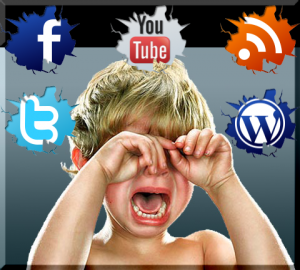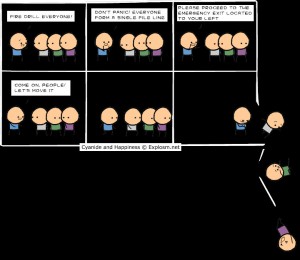CAT
Erica’s Reflection #2
0When I was a teenager, my youth group at church would do a media fast every year. We would dedicate anywhere from one to three weeks of time where we unplugged from all media types, including internet, television, gaming systems, and phones. Our decision was that instead of dedicating time to do these recreational things that often consume our waking hours, we instead were going to dedicate time to reading our Bibles and praying. So ever since I was in seventh grade, I have gone through a social media “blackout” once every year. I can’t say that our media fasts were life altering in the sense that I never re-acquired my social media “addictions”. Usually, as soon as the fast was over, I would go back to my normal media use. But it has given me a new perspective on how I spend my time.
I wasn’t born in a time where instant entertainment was the norm. Yet by the time I had reached middle school–the prime of social awareness–the new millennium had ushered in it’s barrage of entertainment and social outlets. For the majority of my “social life”, as I shall call it, I have owned a cell phone, had access to high-speed internet at home, and been a member of at least one social media group. And just like every other human being who hasn’t grown up in complete solitude, I have soaked in the society around me. Social media and instant entertainment have become expectations of life for me. Not that I allow them to consume or define who I am, but I am constantly connected to the world outside of my four walls in some media-related way.
Realizing that makes me both cautious and grateful. Cautious because I don’t want entertainment to become an addiction that I put before the important things in my life. Grateful because it has allowed me to add to my learning, keep connections that would otherwise not be possible, and engage with the world at large. On a large scale, I feel that social media is beneficial for my life. On a small scale, I can see it’s negative affects and what I need to change about my habits.
For this reflection, I decided to unplug for just one day. The day I chose happened to be really busy, so it wasn’t that hard to do. Most of the day I was either in class, working, getting ready for church, in church, or with friends. I found that having a busy schedule translated into less time thinking about missing social media, but I still had my moments where I almost got onto Facebook or Twitter until I remember I was unplugging. I have to admit, after sitting in a car for 45 minutes and then realizing it was fifteen minutes after midnight (thus the end of my blackout), I promptly checked my Facebook.
The one thing I am always reminded of when I unplug is how much social media and entertainment permeate my life. I often get into the habit of checking my Facebook page as I stroll to class, spending time on Pinterest when I have an hour break, or reading posts from the blogs I follow when I’m waiting for something. There are few other things in my life that I dedicate so much free time to beside my social media craving. And now it makes me wonder, what if my every free moment was filled with a craving to pray or read the Bible? What if I used my times of wait to meet someone new I’m standing next to or catch up with an old friend. What if I used Facebook as a way to develop connections with people instead of just using it as my personal news channel for what’s going on in other people’s lives. Social media has made parts of my life so un-interactive. And what would happen if I changed that?
I think initiating a campus-wide social media blackout would be a great experience for everyone. No matter how hard it may be for some people to pull the plug, in the end I think everyone would learn something from it. But I have also begun to understand the importance of having personal media blackouts throughout my day, every day. I’ve never been someone who is attached to my phone, in fact, I often leave it places and have several missed calls and texts. But my computer almost never leaves my side when I’m at home or in my apartment. This week, I started to realize how distracting my computer is for me during homework or study times. So, I started using computer time as a reward for finishing homework. Once I complete a reading or problem set, I reward myself by checking Facebook or pinning for a few minutes. I think a similar plan like this would be beneficial for a lot of college students to adapt. Make yourself unplug during the times you need to be focused and see how much more productive you can be.
Jessica Marie – Unplugging Reflection
0My reflection can be seen using the following link:
http://blogs.butler.edu/jmbiggs/information-commons/reflections/unplugging-reflection/
Reflection #2
0Read http://campustechnology.com/Articles/2011/09/28/Harrisburg-U-Suffers-Withdrawal-of-Social-Media.aspx?p=1
Then answer the following questions. Reflections are due this Monday 10/10/11
1. Without having experienced a social media withdrawal, how can you imagine it would it affect your daily routine?
2. Once you have answered 1 above, complete a self-imposed “unplugging” from one or more social networks that you typically use. Fully dis-engage from your iPhone, Facebook, Twitter or other social tool. How long were you able to stay unplugged? What was easiest/hardest about disengaging? What did you learn in the process?
3. What alternatives to completely unplugging might be good suggestions for your peers as they learn to balance social engagement in online and real-world environments?
Your reflection can include details about what you did and which tool you chose, but the majority of your writing should reflect your inquiry about and understanding of how the exercise impacted you.
Reflection 2 – 9/30/11
0- 1. Without having experienced a social media withdrawal, how can you imagine it would it affect your daily routine?
I actually have personally experienced s social media withdrawal due to traveling every year and during my studying abroad last year also. I traveled with a group of 14 students. I recalled when we were in Nicaragua for approximately 5 weeks; we had absolutely no connection to the internet. And it felt like a real withdrawal because it’s not like you could step off campus and there’s the rest of the social media world again. There was no smartphones that’ll work through 3G either (most of the group don’t even have a phone because we travel throughout so many country).
Life was definitely different. I felt like I had more person to person time and not so much online or on the computer or my cell phone. It forced us to be closer together because we would actually spend our time on personal interaction rather than, for example, when we were in Panama we had an internet connection and you can see that everyone’s off doing their own thing on their computer (mostly social media) during our free times.
Another time of the year that I would have a social media withdrawal is during Christmas when I would go visit my parents in Thailand. It’s not a complete withdrawal but the internet connection is usually so slow that I’m not patient enough for it and I wouldn’t be able to use my Iphone either. I would usually feel like I’m cut off from the rest of the world for that December month. Although I feel like I’m cut off, it was probably the best thing that could happened because it forces me to actually spend my undivided attention with my families.
Overall I would definitely say that social media plays a huge role with my daily routine and even life-style. Life here is at a speed far faster than the rest of the world. And I feel like that lifestyle has its consequences. I still couldn’t honestly say that one is better than the other but you can see the positives and negatives for both life-styles. I think that we shouldn’t take what we have for granted but then also try to find where the happy medium of those two worlds meet. I know that it’s an easy thing to say but the line is very thin.
- 2. Once you have answered 1 above, complete a self-imposed “unplugging” from one or more social networks that you typically use. Fully dis-engage from your iPhone, Facebook, Twitter or other social tool. How long were you able to stay unplugged? What was easiest/hardest about disengaging? What did you learn in the process?
Approximately 7 hours at the max when I sleep. I’m technically married to my Iphone. The easiest and hardest thing about dis-engaging in social media I think is it forces me to spend my time some other way. The article mentioned “Thirteen percent of student respondents said they rely on Facebook to combat boredom between classes,” and it’s so true. In previous question I’ve stated some of the reflections but I’ve definitely learned that
- 3. What alternatives to completely unplugging might be good suggestions for your peers as they learn to balance social engagement in online and real-world environments?
I think we should try and make a conscious effort to arrange more time to spend in the real world with the people around you. I’ve read another article about how social media and texting will change the way our generation communicates. There’s study that shows how social networking is hurting the communication skills of college students. (http://www.thedaonline.com/opinion/social-networking-hurts-the-communication-skills-of-college-students-1.1689315) It’s ironic how what’s created for the purpose of connecting and linking people together is pulling people apart in reality. I remembered someone once said to me “the more friends you have on Facebook the less friends you have in real life,” and the irony is there. Coincidentally I was watching the movie the Social Network last night and it was funny to see how a person who created the most popular social media website is a guy who has problems with his social skills in real life. As I mentioned in the first question, we just have to find that thin line balance and do the best you can.
Marcus’s Retreat Reflection
0This year to make my Information Commons experience a success one I plan on keeping an open mind toward new and more advanced technologies. I plan on building positive relationships with co-workers as well as faculty and staff. I want to be able to help people in a manner such that they walk away saying that I was positive, effective and enlightening. If I can do that, this year will be a successful one.
I feel as though my personal goals of success will make Info Commons better as a whole. If I employ these goals then I think that it will make the Information Commons better as a whole.
The session on Thursday was one that represented the Information Commons in as best of a light as possible. The fact that a job will show concern about an employee’s life and welfare speaks greatly about that entity. The fact that one of the upper levels of administration presented that session really proves to me that the all around welfare of student workers in the Information Commons is a genuine concern.
Rocky’s First Reflection
01) What goal do you have for this year to make your Info Commons experience a success?
My ultimate goal is to familiarize myself with any technology that I have not yet acquire knowledge about. Then, interpersonal relationships between people would be my nearest objective; it is due to my late arrival that I have not had the opportunity to meet with everyone, and in the least to introduce myself to them. After that, the last goal will be to enjoy the job with good working ethics and attitudes.
2) What goal do you have for this year to make Info Commons better as a whole?
Info Commons is an outstanding group of people that provide extensive help to all Butler students on campus. Unfortunately, not many of them really know about our presence. Talking with students I know, they all seem to mix Info Commons up with IT Help Desk. Therefore, my goal of this year will be to spread the words out to more students about this awesome program, which can help them with technology-relating questions in their courses of studying.
3) What is your feedback on the whole life values and experiences session we had on Thursday?
I wasn’t able to make it to the retreat; thus, please pardon me for my lack of knowledge on this question.
Rocky
Michelle’s Reflection
0What goal do you have for this year to make your Info Commons experience a success?
My first goal is to catch up on what I missed at the retreat. I feel as if I missed out on the first stage of success in Info Commons, so I need to get caught up! My second goal would be to obtain an abundance of knowledge and experience in regards to technology, building work relationships, and the resources Butler students and faculty have available to them. The more knowledge and experience I have, the better resource I will be not only to myself, but also to other Info Commons workers and the Butler community that we assist.
What goal do you have for this year to make Info Commons better as a whole?
Info Commons has the potential to help every person on Butler’s campus, but few know about who we are, what we do, or how we can provide them that help. I believe that Info Commons can be better as a whole if we find new ways to communicate with the Butler community. Talking to more professors to increase the number of in class tutorials as well as asking students what technology assistance they need are only some ways to increase the community’s awareness about what Info Commons is all about.



